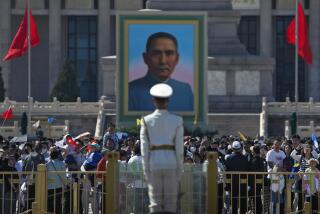Fang Lizhi dies at 76; Chinese dissident
- Share via
Fang Lizhi, one of China’sbest-known dissidents whose speeches inspired student protesters throughout the 1980s, has died in the United States, where he fled after China’s 1989 military crackdown on the pro-democracy movement. He was 76.
His wife, Li Shuxian, confirmed that he died Friday in Tucson, where he had been a University of Arizona physics professor for about 20 years.
As a leading astrophysicist in China and a senior administrator at the Chinese University of Science and Technology, Fang was once a ranking member of the Community Party. He was expelled in 1987 after encouraging students to demonstrate for democratic reform.
Those demonstrations in 1986 and 1987 turned out to be precursors of the upheavals around Tiananmen Square. After the June 4, 1989, military crackdown that crushed the seven-week pro-democracy movement, Fang and his wife hid inthe U.S. Embassyfor 13 months.
“I am an astrophysicist, and yet I cannot see the sky,” Fang complained.
Fang and his wife were among a small group the party blamed for the democracy movement. They had been named in warrants that could have carried death sentences upon conviction. American diplomats refused to turn them over to Chinese authorities.
China allowed the couple to leave the country in 1990. The decision eliminated a major obstacle to bettering China-U.S. relations, which had deteriorated after the crackdown that left hundreds and perhaps thousands dead.
“He was not only a human rights fighter but also an important scientist,” Wang Dan, a fellow June 4 dissident based in Arcadia, said Saturday. “In his life, what impressed me is he combined both roles successfully. When I was a young student, he always told me that in order to promote democracy, one must have knowledge.”
The son of a Hangzhou postal clerk and his wife, Fang was born in 1936 and entered Beijing University at age 16 to study physics. His future wife was in the same department.
After he went to work at China’s Institute for Modern Research, he was expelled from the Communist Party for advocating academic freedom yet remained a believer, he recalled in 1990 in The Times.
During the Cultural Revolution of the late 1960s, Fang again ran afoul of party politics while teaching in Beijing at the newly organized University of Science and Technology, considered China’s MIT.
After being incarcerated for a year, he was forced to work in the countryside in a mine and on the railroad. The treatment he endured began to unravel his belief in the Chinese Communist Party system.
By the mid-1980s, Fang was a vice president of the university and in demand at colleges as an outspoken supporter of democratic and economic freedoms.
In fall 1989, Fang was in hiding when he received theRobert F. KennedyHuman Rights Award. His acceptance speech that was read to the audience asked: “How, then, can the human race that has evolved in a universe of such fundamental equality fail to strive toward a society without violence and terror?”
He is survived by his wife and a son.
More to Read
Start your day right
Sign up for Essential California for the L.A. Times biggest news, features and recommendations in your inbox six days a week.
You may occasionally receive promotional content from the Los Angeles Times.




















































